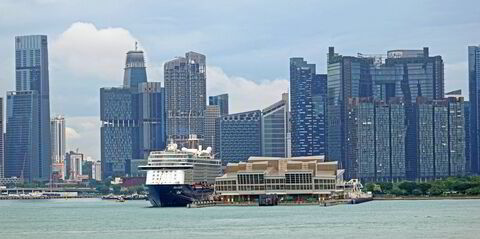Vandita Pant, chief commercial officer of mining giant BHP, is confident that strong growth in commodities demand will keep bulk carriers busy for a good while longer.
However, she cautioned that it is unlikely there will be another commodities supercycle.
Pant, whose remit includes freight and shipping, said at the Sea Asia conference on Tuesday that vessel congestion resulting in supply chain disruptions caused by the coronavirus has effectively taken 15% of vessel capacity out of the bulker market.
The double-digit percentage is double the 7% to 8% experienced in pre-Covid-19 times.
“This is very much reflected in the price of freight,” she said.
Pant described the drop in commodities demand after the outbreak of the pandemic as being a sharp ‘V’ shape.
“The return of flows is quite remarkable," she said. "Last year, China rebounded very quickly, and this year the rest of the world has come back like a tailwind.”
This rebound has not come without its problems. Congestion at ports that continue to be plagued by Covid-19 disruption has led to exporters and shippers looking to source bulkers to carry their cargo, frequently finding that none are available.
Pant expressed a bullish view on the commodities markets. She expects demand for iron-ore, copper, nickel and other ferrous metals to grow significantly over the next few years.
“Trade demand for commodities will not go away. Industrial growth and consumer demand will continue,” she said, adding that building the infrastructure for decarbonisation will create further demand for commodities.
Asked whether this would lead to another supercycle, Pant described it as “too grand a word”.
“The market looks very positive going forward,” she said. “There is a good trajectory of demand.”
This bodes well for a solid performance for dry bulk, where some major players have predicted that strong rates will continue for at least the next two years on the back of rising commodity shipments.
Berge Bulk chief executive James Marshall said at a recent Marine Money conference in Singapore that pandemic-related constraints such as strains on logistics and the efficiency of the fleet added short-term “spiciness” to an already strong market.





